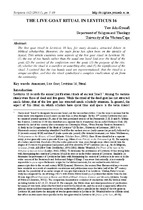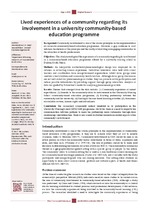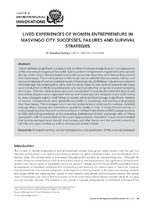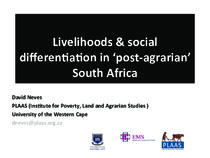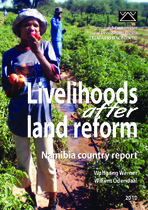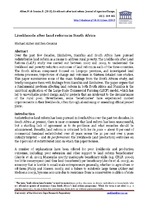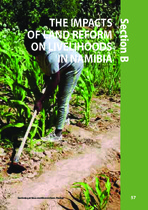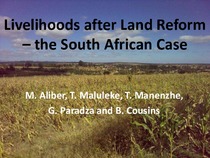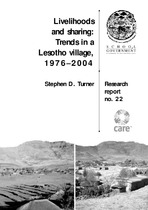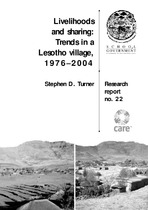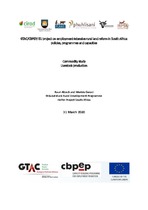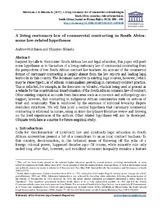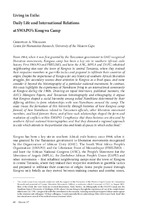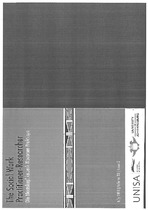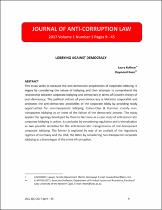Browsing by Title
Now showing items 4071-4090 of 7879
-
The live goat ritual in Leviticus 16
(Stellenbosch University, 2013)The live goat ritual in Leviticus 16 has, for many decades, attracted debate in biblical scholarship. However, the main focus has often been on the identity of Azazel. This article examines some aspects of the live goat ... -
Lived experiences of a community regarding its involvement in a university community-based education programme
(AOSIS OpenJournals, 2013)BACKGROUND: Community involvement is one of the crucial principles in the implementation of successful community-based education programmes. However, a gap continues to exist between the rhetoric of this principle and the ... -
Lived experiences of women entrepreneurs in Masvingo city: Successes, failures and survival strategies
(University of Western Cape, 2021)There has been a significant increase in the number of women entrepreneurs in various sectors of the economy throughout the world. Some women entrepreneurs registered some success stories, while others dismally failed and ... -
Livelihoods & social differentiation in ‘post-agrarian’ South Africa
(2017)• Legacy: Settler colonialism & migrant labour • Industrialization & proletarianisation • Dichotomous agrarian landscape • Rural poverty, esp. former homelands • Longstanding deagrarianisation -
Livelihoods after land reform
(Institute for Poverty, Land and Agrarian Studies, University of the Western Cape, 2010)In 1990, Namibia emerged from colonial rule with a skewed distribution of agricultural land and high levels of poverty. The new government led by SWAPO Party initiated a process to address the land question within the ... -
Livelihoods after land reform in South Africa
(Wiley, 2013)Over the past few decades, Zimbabwe, Namibia and South Africa have pursued redistributive land reform as a means to address rural poverty. The Livelihoods after Land Reform (LaLR) study was carried out between 2007 and ... -
Livelihoods after land reform: Namibia country report (2010)
(Land, Environment and Development Project, Legal Assistance Centre, 2010) -
Livelihoods after land reform: Namibia country report (2010) Section B
(Land, Environment and Development Project, Legal Assistance Centre, 2010)The first AALS farmers in Hardap obtained their land in 1992, and the most recent in 2003. In Omaheke, the first AALS farmer obtained his farm in 1992 and the most recent, a woman, in 2000. Thus in both regions the oldest ... -
Livelihoods after land reform: The impacts of land reform on livelihoods in Namibia: Section B
(Institute for Poverty, Land and Agrarian Studies, University of the Western Cape, 2010)The first AALS farmers in Hardap obtained their land in 1992, and the most recent in 2003. In Omaheke, the first AALS farmer obtained his farm in 1992 and the most recent, a woman, in 2000. Thus in both regions the oldest ... -
Livelihoods after land reform: The South African case
(Institute for Poverty Land and Agrarian Studies (PLAAS), 2012)SA’s land reform regarded as a failure – economic objectives – the spectre of ‘failed projects’ – changing the racial pattern of land ownership – too slow • No consensus as to why, or what to do • Even so, ambitious ... -
Livelihoods and sharing: Trends in a Lesotho village, 1976–2004
(Institute for Poverty, Land and Agrarian Studies, University of the Western Cape, 2005)In 2004 I was fortunate enough to be able to return to Ha Tumahole, the village in Lesotho where I undertook research on farming and livelihoods in 1976–77, and spend four weeks learning about what had changed in ... -
Livelihoods and sharing: Trends in a Lesotho village, 1976–2004
(PLAAS, University of the Western Cape & Cooperative for Assistance and Relief Everywhere Inc. (CARE), 2005-10)The study compares the livelihoods and inter-household sharing mechanisms in a Lesotho village across a 28 year period. The report examines the complex socio-economic structures and systems that are in place in the rural ... -
Livestock and the rangeland commons in South Africa’s land and agrarian reform
(NISC (Pty) Ltd and Taylor & Francis, 2013)Land and agrarian reform has the potential to expand South Africa’s rangeland commons and enhance their contribution to the livelihoods of the rural poor, yet to a large extent this has been an opportunity missed. ... -
Livestock production
(GTAC, 2020-03-31)This paper is a thematic study for livestock production by smallholders and small-scale black commercial farmers in South Africa. Its aim is to identify the potential for successful expansion of the number of such farmers ... -
A living customary law of commercial contracting in South Africa: some law-related hypotheses
(Taylor & Francis, 2017)Inspired by calls to ‘decolonise’ South African law and legal education, this paper will posit some hypotheses as to the nature of a living customary law of commercial contracting from the perspectives of two South African ... -
Living in exile: daily life and international relations at SWAPO’s Kongwa Camp
(Published by History Department, University of the Western Cape, 2011)From 1964, when it was first granted by the Tanzanian government to OAU recognized liberation movements, Kongwa camp has been a key site in southern Africa’s exile history. First SWAPO and FRELIMO, and later the ANC, MPLA ... -
Living on what others throw away: an exploration of a socio-economic circumstances of people collecting and selling recyclable waste
(Unisa Press, 2011)Street waste pickers are becoming a common sight on the streets of South Africa’s cities and suburbs. Little research has been done on this social phenomenon. The aim of this article is to explore some of the socioeconomic ... -
'A living testimony of the heights to which a woman can rise’: Sarojini Naidu, Cissie Gool and the Politics of Women’s Leadership in South Africa in the 1920s
(Taylor & Francis, 2012)A leading force in the Indian National Congress, Sarojini Naidu arrived in Johannesburg, South Africa, at the end of February 1924 after receiving an invitation to support South African Indian political organisations in ... -
Living with xenophobia: Zimbabwean informal enterprise in South Africa
(Southern African Migration Programme, 2017)South Africa’s crisis of xenophobia is defined by the discrimination and intolerance to which migrants are exposed on a daily basis. A major target of the country’s extreme xenophobia – defined as a heightened form of ... -
Lobbying against democracy
(University of the Western Cape, 2021)This essay seeks to excavate the anti-democratic propensities of corporate lobbying. It begins by considering the nature of lobbying and then attempts to comprehend the relationship between corporate lobbying and democracy ...

